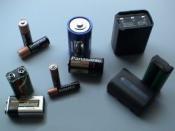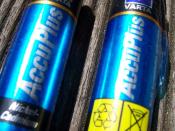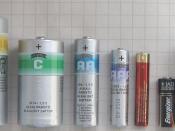Battery Recycling Proposal
When you need a portable, convenient power source, you can always rely on batteries. But, although they are convenient and portable, they also represent many environmental problems and therefore providing the need for recycling. My battery recycling proposal will be divided into the three major aspects of recycling; information, collection, and disposal.
Information
Inside a battery, heavy metals react with chemical electrolyte to produce the batteries power. It is these heavy metals such as mercury, lead, cadmium, and nickel which can leak and in turn, contaminate the environment when batteries are disposed of improperly. Batteries can also contaminate the atmosphere when incinerated and can concentrate in the ash produced by the combustion process.
There are two types of batteries; the dry-cell, and wet-cell. The type that I will be concentrating on are the dry-cell batteries and more pacifically the alkaline and zinc-carbon (9-volt, D, C, AA, AAA), mercuric-oxide (button, and some cylindrical and rectangular) varieties due to the fact that they are the most commonly used and also due to the context that most students don't drive and have no need for car or other automotive batteries.
Collection
Any one who wants to help the environment can help me help it by sending all their used dry-cell batteries to one of the many bins for each type of battery in all of their head of house's office. The bins will remain in the offices all year.
Each person will have to enter a minimum of 5 batteries (this is a resin able number due to the fact that on average, each person in the United States discards only 8 dry-cell batteries each year) to be eligible to buy a ticket of the cost 1$ to enter a raffle. At the end of each term a winner will...


